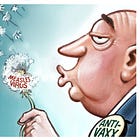Phantom Science: RFK Jr.’s Health Report Cites Studies That Don’t Exist
A federal health initiative grounded in fiction and possibly AI-generated research deserves more than a formatting excuse.
This wasn’t a blog post. It was a government document released with official fanfare, a federal seal, and the weight of the U.S. Department of Health and Human Services behind it. And it cited research that doesn’t exist.
On May 29, 2025, the Department of Health and Human Services unveiled the “Make America Healthy Again” (MAHA) report, a 73-page document led by Health Secretary Robert F. Kennedy Jr. and billed as a comprehensive roadmap to reverse chronic illness in children. Branded as “gold-standard science” and packed with over 500 citations, the report looked authoritative at a glance.
Then, researchers started clicking the links.
We just hit 14,000 subscribers—thank you!
Get exclusive access for just $1/week or $52 a year.
Get exclusive analysis and fearless reporting you won’t find in corporate media.
At least seven of those studies don’t exist. Others were misattributed or mischaracterized. One citation pointed to a supposed JAMA Pediatrics article authored by Columbia epidemiologist Dr. Katherine Keyes, only she never wrote it. Another was attributed to Dr. Robert L. Findling, who also denied involvement. In some cases, the citations included URLs with the string “oaicite”, a telltale sign that generative AI tools, such as ChatGPT, may have played a role.
And yet, when pressed, the White House insisted the problems were merely “formatting issues.”
This isn’t a typo. It’s a federal health policy laced with fake science and possibly ghostwritten by an unaccountable algorithm.
If the report’s purpose was to shape national health strategy, its foundation should have been bulletproof. Instead, it’s riddled with smoke and mirrors, and no one in power seems interested in investigating who lit the match.
What the MAHA Report Claimed to Be
To understand the seriousness of this issue, we must examine what the report was intended to be.
Unveiled with fanfare by HHS, the “Make America Healthy Again” (MAHA) report was positioned as a cornerstone of RFK Jr.’s public health agenda. At 73 pages and more than 500 citations, it promised a sweeping vision to confront America’s “childhood chronic illness epidemic”, a cause Kennedy has long made central to his public identity.
The report warned of a sharp rise in conditions like autism, autoimmune disorders, and anxiety among children. It argued that the current medical establishment was failing young Americans and called for a full-scale health policy overhaul. Among its prescriptions: reduced pharmaceutical dependency, aggressive nutritional reforms, and a return to “natural” interventions.
However, this wasn’t presented as a personal opinion. The MAHA report cloaked itself in scientific authority with footnotes, graphs, and dense references. It appeared to be a significant piece of federal health policy. Kennedy even called it “a historic opportunity,” insisting that “the science is clear—we can reverse the damage.”
Now, with key parts of that science unraveling, and with the report’s credibility in freefall, it’s becoming clear what the MAHA report really was: not a data-driven roadmap, but a political document dressed in a lab coat.
We’ve reported previously on RFK, the shakeups occuring at federal health agencies, and the dangers these types of action are creating. See some of that reporting here:
Note: These articles are more than 45 days old and now live in our archive. Please consider becoming a paid subscriber for the full 600+ article archive, exclusive content, and occasional early access.
Fake Science, Real Consequences
This isn’t a harmless academic slip. It’s a public health betrayal masquerading as policy, and it’s already causing harm.
The MAHA report was never just a PDF. It was promoted as federal guidance, cited by governors, and used to justify legislation. Since its release, lawmakers in at least four states have proposed bills to roll back childhood vaccine mandates and weaken school nutrition standards, directly citing the report’s conclusions.
Those conclusions now rest, in part, on imaginary studies.
A report citing fabricated science isn’t just a policy blunder; it’s a blueprint for harm.
Worse still, the origins of these fake citations point to a silent accomplice: generative AI.
Several of the report’s most suspect citations include URLs embedded with the string “oaicite”, a standard output from AI tools like ChatGPT when they attempt to “guess” citations that sound real but aren’t. Researchers flagged this almost immediately. Medical publishing experts, including Retraction Watch’s Ivan Oransky, have warned that the report’s reference section appears at least partially machine-generated.
So far, no one at HHS or the White House has admitted that AI was used. Instead, Press Secretary Karoline Leavitt called the errors “formatting issues”, a phrase so dismissive it borders on gaslighting.
These dismissals set the stage for a more disturbing truth. Because here’s the reality: If the federal government can quietly pass off AI-generated pseudoscience as public health policy with no disclosure, no accountability, and no correction until journalists catch it, then the damage isn’t limited to one report. It’s a crack in the foundation of public trust.
“This sets a terrifying precedent,” one NIH-affiliated pediatrician told The Guardian. “The next report might cite a study that doesn’t exist—and get someone killed.”
The AI Loophole and the Accountability Vacuum
This isn’t just about one flawed report. It’s about what happens when technological shortcuts meet political agendas, and there are no rules to stop them.
If generative AI played even a partial role in writing the MAHA report—and the digital fingerprints suggest it did—then we’ve entered dangerous new territory. There is no federal law currently requiring public officials to disclose when AI is used in drafting policy. Not for internal memos. Not for public health reports. Not even for documents that directly influence legislation.
And when the result includes hallucinated studies and fabricated medical evidence? It’s not just bad science; it’s machine-authored malpractice, rubber-stamped by a U.S. Cabinet Secretary.
This didn’t happen in a vacuum. It happened in a regulatory void, where speed, narrative, and ideology now seem to matter more than facts. No review board caught it. No internal watchdog flagged it. The errors were only discovered because journalists and researchers started reading closely.
To make matters worse, as we’ve recently reported, the current budget bill in the Senate (and already passed by the House) places a 10-year moratorium on states making laws regulating AI, laws that could prevent incidents such as this.
This is how disinformation enters government in the age of AI: dressed in citations, devoid of scrutiny.
This isn’t a slippery slope. It’s a documented fall. If this feels like science fiction, consider what’s already real:
A federal report citing fake data.
State laws being drafted based on that report.
No legal framework to hold anyone accountable.
And a press secretary waving it all off as “formatting issues.”
Imagine if the Pentagon published a national defense strategy using AI-generated intelligence that didn’t exist, or if the CDC published vaccine data pulled from a chatbot. The only difference here is that this one already happened, and it was aimed at your children’s health.
What We Should Demand Now
The MAHA scandal isn’t just a bureaucratic embarrassment. It’s a warning flare, and what we do next will determine whether it was an outlier or a blueprint.
Because if a sitting U.S. Cabinet Secretary can publish a major health policy document littered with fake studies, possibly generated by AI, and face no investigation, no apology, and no correction beyond a quiet edit, then what else can be faked next?
We’ve reached a tipping point where truth in public policy is optional unless we make it mandatory.
Here’s what must happen immediately:
1. AI Disclosure Laws for Federal Agencies
Any public-facing document produced by a federal agency must include a clear disclosure if generative AI was used in any stage of drafting. No more vague denials. No more digital fingerprints without accountability.
2. Independent Scientific Review of the MAHA Report
The Department of Health and Human Services cannot be allowed to investigate itself. A panel of independent epidemiologists, data scientists, and ethics scholars should publicly review the MAHA report’s methodology, sourcing, and use of AI.
3. Congressional Oversight Hearings
RFK Jr. must be called to testify before Congress. This isn’t partisan. It’s about protecting the public from fraud dressed up as federal health guidance.
4. Press for State-Level Reversals
Any legislation introduced or passed based on the MAHA report should be paused or repealed until its sources can be verified. Lawmakers who use flawed data to inform public health decisions should be identified and held accountable by their constituents.
Take Action: Demand Accountability Now
This isn’t just a policy failure. It’s a test of whether we’ll accept government documents written with fictional science and ghostwritten by machines. If we let this slide, we invite more of it.
Here’s how to act now:
Contact Your Representatives
Demand congressional oversight of the MAHA report and federal disclosure rules for AI use in public documents.
Call the U.S. Capitol Switchboard: (202) 224-3121
Sample Script:
“Hi, my name is [Your Name], and I’m calling to demand congressional hearings on the MAHA report released by HHS under Secretary Robert F. Kennedy Jr. This report contains fake studies and possibly AI-generated content passed off as official science. I want my representative to investigate, support disclosure laws for AI use in government, and call for an independent review of the MAHA report.”
Spread the Word
Share this article. Tag your lawmakers. Tag the media. Don’t let this get buried as a “formatting issue.”
Use hashtags:
#RFKJr #MAHAReport #FakeScience #AIinGovernment #AccountabilityNow
Support Truth in Public Policy
Push for AI transparency and independent oversight—not just in health policy, but across every federal agency.
When science can be faked and no one’s held responsible, democracy suffers. Let’s not wait for the next hallucinated policy to prove it.
RFK Jr. promised to “Make America Healthy Again.” Instead, he fabricated science, concealed the evidence, and hoped no one would notice.
We noticed.
Now it’s time to act like it matters.
We just hit 14,000 subscribers—thank you!
Get exclusive access for just $1/week or $52 a year.
Get exclusive analysis and fearless reporting you won’t find in corporate media.
Bibliography:
“White House Acknowledges Problems in RFK Jr.’s ‘Make America Healthy Again’ Report.” AP News, May 29, 2025.
Beckett, Lois. “RFK Jr’s ‘Maha’ report found to contain citations to nonexistent studies.” The Guardian, May 29, 2025.
Goldberg, Michelle. “Did RFK Jr.’s Crew Use AI to Write Error-Filled MAHA Report?” New York Magazine, May 29, 2025.
“MAHA Report May Have Garbled Science by Using AI, Experts Say.” The Washington Post, May 29, 2025.
“RFK Jr.’s MAHA Report Included Lots of Bogus Studies.” The Daily Beast, May 29, 2025.
Habeshian, Sareen. “White House moves to fix errors in MAHA commission report.” Axios, May 30, 2025.
Dorn, Sara. “White House Blames Nonexistent Medical Citations In RFK Jr.’s ‘MAHA’ Report On ‘Formatting Issues’” Forbes, May 29, 2025.
“RFK Jr.’s ‘Make America Healthy Again’ Report Cites Fake Studies.” Gizmodo, May 29, 2025.









They exist only in his lying imagination, same resources that all of the MAGA Trump regime uses.
These are really difficult time we are living in.
And the ban on AI regulation for 10 years is also included in the bill.
And that alone is reason enough to reject it.